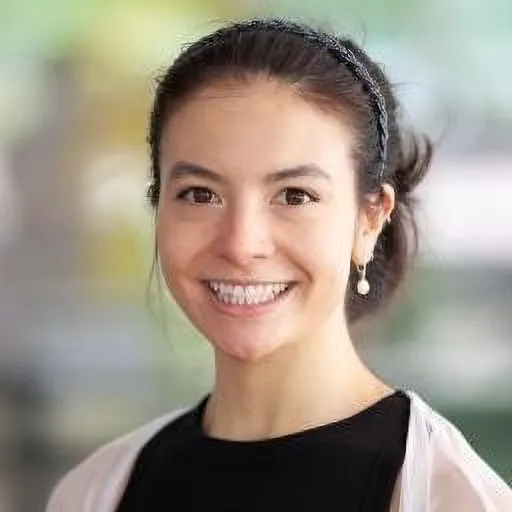Hikari Sorensen
Hikari Sorensen is a Researcher at the California Institute for Machine Consciousness (CIMC) and a leading voice in the intersection of machine learning, computational biology, and artificial consciousness. With expertise spanning applied mathematics, deep learning, and protein engineering, she brings a unique interdisciplinary approach to exploring the computational foundations of consciousness.
She studied mathematics and computer science at Harvard University and went on to work in research, applying machine learning to computational biology, before joining CIMC at its launch. She has since focused on machine consciousness at CIMC.
As a Researcher at CIMC since April 2025, Hikari focuses on developing testable theories of machine consciousness and exploring how computational approaches can illuminate the fundamental nature of mind. She serves as co-chair of the Machine Consciousness: Philosophy and Implementation workshop at AGI-25, organized in collaboration with the Association of Mathematical Consciousness Science (AMCS) Workshops – AGI-25.
At AGI-25, she presented on computationalist functionalism, arguing that: “If there is an experience to be had, it needs to be represented somewhere.” CIMC, launched in May 2025 under the direction of Joscha Bach with Jim Rutt as Chairman, represents a groundbreaking initiative to bridge artificial intelligence, neuroscience, and cognitive science in understanding consciousness.
Prior to CIMC, Hikari served as a Machine Learning Scientist at NOETIK from January 2025 to April 2025, where she contributed to the company’s mission of leveraging advanced machine learning methods to discover and develop cancer immunotherapies.Noetik is an AI-native biotechnology company that combines self-supervised learning with industrial-scale generation of human multimodal data to create novel foundation models for virtual cell and tissue biology.
From August 2022 to January 2025, she worked in Computational Biology and Machine Learning at Apertura Gene Therapy. As Apertura’s first computational hire, she played a pivotal role in the company’s spin-out from the Deverman Lab at the Broad Institute, establishing foundational capabilities in data science, software engineering, and IT.
She developed machine learning models and algorithms for protein engineering, generating novel AAV capsid variants optimized for crossing the blood-brain barrier (BBB). This work involved processing and analyzing biological data, creating automated pipelines, and improving scoring and prioritization methods to identify high-performance capsids with enhanced in vivo success.
Her groundbreaking research at Apertura culminated in a major publication in PLoS Biology: Targeting AAV vectors to the central nervous system by engineering capsid-receptor interactions that enable crossing of the blood-brain barrier. As a coauthor, Hikari contributed to data curation, formal analysis, investigation, methodology, visualization, and writing of the paper.
From July 2020 to July 2022, Hikari worked as an Associate Computational Biologist at the Broad Institute of MIT and Harvard, where she developed machine learning models for protein engineering in the Stanley Center for Psychiatric Research. Her work focused on generating novel AAV capsid variants and contributed to the development of innovative gene delivery solutions for studying the central nervous system.
Hikari earned her Bachelor’s degree in Mathematics and Computer Science from Harvard University in 2020, graduating with Honors, Cum Laude in the Field. During her time at Harvard, she completed an extensive curriculum including courses in algebraic geometry, algebraic topology, machine learning, computational learning theory, cryptography, and supervised research in deep learning and the intersection of topology and machine learning.
In 2017, after her freshman year, she attended the Wolfram Summer School, where she worked on a project titled Learning Weights in LeNet, which focused on visualizing neural network training dynamics. Her profile notes her love for “thinking about the structures underlying real phenomena” and abstracting things, considering them in their abstract form. She explored Ramsey Numbers as her Topic Exploration project at the summer school.
Throughout her career, Hikari has demonstrated expertise in diverse technical areas, including shell scripting, AAV capsid engineering, visualization, next-generation sequencing (NGS) data analysis, and various machine learning frameworks. Her interdisciplinary background combines mathematical training with practical applications in biotechnology and artificial intelligence research.
She has been involved in developing automated pipelines for biological data processing, creating scoring systems for protein variants, and implementing machine learning solutions for complex biological problems. Read Researchers reprogram gene therapy viral vectors to bind specific protein targets.
Her work bridges multiple domains, from theoretical investigations of
consciousness to practical applications in gene therapy. At CIMC, she
contributes to the institute’s mission of developing a scientific
foundation for machine consciousness, working alongside leaders in the
field, including Joscha
Bach, Erik Newton, and
collaborators from institutions worldwide. The institute’s approach
combines theoretical models with practical implementations, addressing
fundamental questions about self-awareness, ethical reasoning, and adaptive
behavior in artificial systems.
Watch presentations from
CIMC’s launch event at the Internet Archive. Watch Hikari Sorensen: What
we are and what we want to do.
Visit her LinkedIn profile and Wolfram Community profile. Follow her work at the California Institute for Machine Consciousness.
